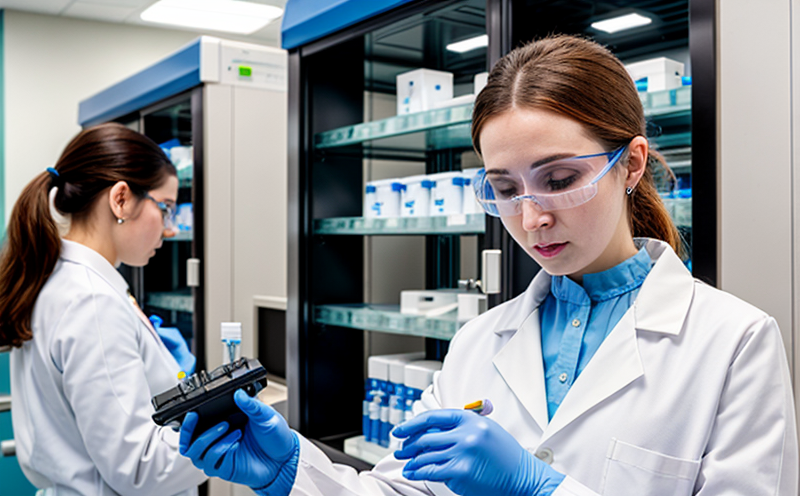NMR Bioanalytical Metabolite Testing
The use of Nuclear Magnetic Resonance (NMR) in bioanalytical metabolite testing is a powerful tool that allows for the identification, quantification, and structural elucidation of small molecules within biological matrices. This technique provides unparalleled sensitivity and specificity, making it particularly useful for complex samples such as those found in pharmaceutical development.
In this service, we employ state-of-the-art NMR spectrometers equipped with advanced pulse sequences designed to optimize the detection of metabolites present at very low concentrations. The process begins by preparing the sample under conditions that preserve its integrity and minimize interference from endogenous compounds. This often involves derivatization or other chemical modifications aimed at enhancing signal-to-noise ratios.
The choice of solvent is critical as it affects both the resolution of NMR spectra and the ability to detect specific metabolites. Common solvents include deuterated water (D2O), DMSO-d6, or CD3OD depending on the nature of the sample. After acquisition of raw data from the spectrometer, sophisticated software packages are used to process these signals into interpretable spectra.
One of the key advantages of NMR is its capability to perform non-targeted screening which enables the discovery of previously unknown metabolites or markers associated with disease states. This approach has proven invaluable in drug development where early identification of biomarkers can significantly accelerate timelines and improve outcomes.
For targeted analysis, we utilize advanced multi-dimensional spectroscopy techniques such as 2D NMR (e.g., COSY, HSQC) which allow for the determination of connectivity between atoms within molecules. This information is crucial not only for structural elucidation but also for understanding metabolic pathways and potential interactions with pharmaceutical agents.
Our laboratory adheres strictly to international standards including ISO/IEC 17025:2017 ensuring accurate, reliable results that meet regulatory requirements both locally and internationally. Compliance officers will appreciate our robust quality management systems while R&D engineers benefit from the high level of precision offered by NMR technology.
The process culminates in comprehensive reports detailing all findings along with interpretations relevant to your project goals. These documents serve as valuable resources not only for internal use but also during regulatory submissions where detailed experimental procedures and results are required.
With our expertise in handling diverse biological samples, including plasma, urine, tissue extracts, cell cultures, we ensure consistent quality across all analyses performed. Our commitment to innovation ensures that we stay at the forefront of technological advancements within this field providing you with cutting-edge solutions tailored specifically for your needs.
Scope and Methodology
The scope of our NMR bioanalytical metabolite testing encompasses a wide range of applications including but not limited to drug discovery, toxicological evaluation, and clinical trial support. We focus on identifying key biomarkers that can provide insights into disease mechanisms or response to treatment.
Our methodology involves several steps starting with sample preparation which may include purification techniques like solid phase extraction (SPE) or liquid chromatography (LC). The prepared samples are then dissolved in appropriate solvents before being analyzed by NMR spectroscopy. For each analysis, we generate a series of 1D and optionally 2D spectra providing multiple perspectives on the molecular composition.
The acquired data is processed using specialized software to calculate quantification constants based on calibration standards. This step ensures that every measurement reflects true concentrations within the sample matrix. Additionally, structural information obtained through multi-dimensional experiments helps refine our understanding of metabolites present in complex mixtures.
Throughout this process, we adhere rigorously to established protocols and best practices outlined by recognized bodies like ASTM E2561-14 which sets guidelines for quantitative NMR analysis of biological fluids. By doing so, we guarantee the highest standards of accuracy and reproducibility.
Eurolab Advantages
At Eurolab, our commitment to excellence translates into superior service offerings that set us apart in the pharmaceutical testing industry. Our team comprises highly skilled professionals with extensive experience across various sectors including biotechnology and healthcare ensuring we deliver accurate and reliable results.
We pride ourselves on maintaining strict adherence to international standards such as ISO/IEC 17025:2017 which governs quality management systems for testing laboratories. This ensures that all our procedures comply with internationally recognized benchmarks thereby enhancing trustworthiness among clients.
Our cutting-edge instrumentation supported by advanced software tools allows us to provide precise and detailed results even when dealing with challenging samples. With continuous investment in research and development, we ensure that our methods remain up-to-date with the latest scientific advancements.
Compliance officers will find value in our transparent communication channels facilitating seamless collaboration throughout the testing process. Our dedicated customer support team provides guidance from initial consultation through final report delivery ensuring every client receives personalized attention tailored to their unique requirements.
R&D engineers appreciate our ability to offer customized solutions designed specifically for their projects whether they involve new drug candidates or existing formulations undergoing optimization efforts. By leveraging our expertise in bioanalytical metabolite testing, we help accelerate innovation and bring safer products to market faster.
Use Cases and Application Examples
The application of NMR bioanalytical metabolite testing is extensive across numerous sectors within pharmaceutical research and development. One prominent example lies in drug discovery where the identification of novel biomarkers plays a pivotal role in advancing therapeutic strategies.
In toxicological evaluations, this technique helps assess potential adverse effects by monitoring changes in metabolic profiles following exposure to test compounds. This approach aids in selecting safer alternatives early in the pipeline thus reducing risks associated with late-stage failures due to toxicity issues.
Another critical area benefiting from our services is clinical trials where precise quantification of metabolites assists in evaluating efficacy and safety profiles of investigational drugs. By providing reliable data on how these compounds interact within human subjects, we contribute significantly towards ensuring successful trial completion leading ultimately to approval by regulatory authorities.
A third application pertains to personalized medicine initiatives wherein individualized treatment plans are based on unique metabolic signatures characteristic of each patient subgroup. Through this precision approach, more effective therapies can be developed catering specifically to diverse populations enhancing overall health outcomes.





